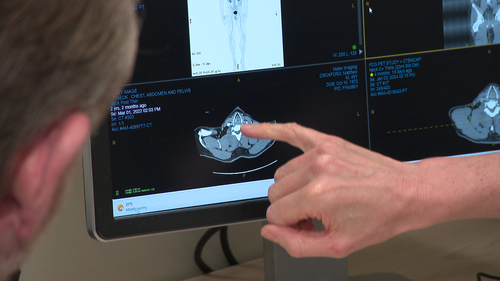Share this @internewscast.com
Experts believe that the innovative treatment method, which will be funded by the Pharmaceutical Benefits Scheme (PBS), could transform the way several fatal cancers are treated.
A tumour the size of a golf ball saw death come knocking for Matthew Croxford.

“You think – is this it?” the 52-year-old father-of-two told 9News.
“And I had a lot of things to still achieve in my life.”
Croxford was offered to take part in an Australian and Netherlands-driven trial.
The new therapy has flipped the cancer paradigm on its head, by giving the body the best opportunity to activate its own cancer-fighting defences.
“It’s similar to how sniffer dogs at the airport are trained to detect certain items like fruits, vegetables, and drugs,” said Professor Georgina Long from The Melanoma Institute.
“By giving immunotherapy before surgery, we train our immune system better against the cancer,” she said.

(Nine)
Of the 423 patients with Stage 3 melanoma, one group received usual treatment with surgery first, then a single immunotherapy drug.Â
That order was then flipped for the other group, who were given two immunotherapy drugs first to shrink the tumour before surgery.Â
“Their chance of the melanoma coming back is next to zero – it’s less than five per cent,” Long said.
Such revolutionary results have seen the treatment approved to be funded by the PBS – a world first.Â

In Australia, melanoma cases are the most prevalent worldwide, with someone being diagnosed every half hour and a death occurring every six hours due to the condition.
Advances in treatment like this shift a diagnosis that has often been a death sentence to promising odds of survival.Â
“I’m effectively cancer-free, I have no side effects whatsoever, and I’m incredibly fortunate,” Croxford said.

The radical overhaul of traditional treatment is now being explored for other cancers, including lung, triple-negative breast cancer, kidney, head and neck cancers.
This new treatment for Stage 3 melanoma patients is to be listed on the PBS within months.










